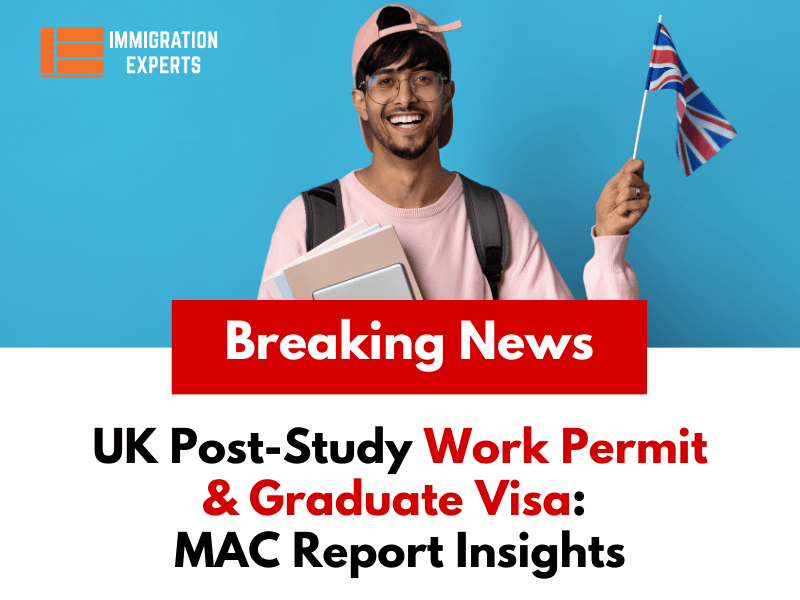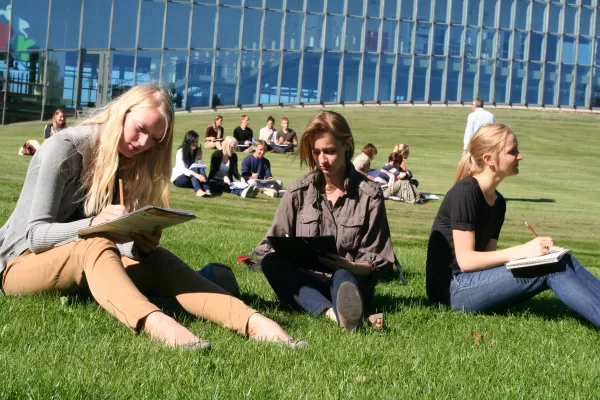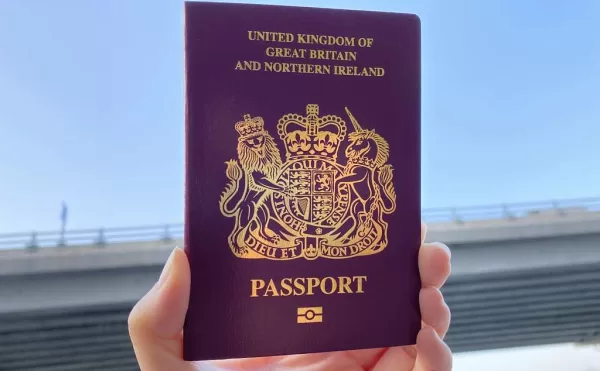051 8439995, 042 35911332

The Migration Advisory Committee (MAC) has finished its quick assessment of the UK graduate route and found no proof of significant misuse.
In an important development for the sector, the report advises the government to keep the two-year visa as it is. It states that the graduate route does not compromise the integrity and quality of the UK’s higher education system. Instead, it aids universities in broadening the range of courses they offer and compensates for financial deficits from domestic students and research.
The much-awaited 70-page report, led by Brian Bell, a professor at King’s College London, was requested by Home Secretary James Cleverly to conduct this investigation.
Here is a summary of the key points from the review.
Things You Will Find In This Page
What Does the MAC Review Recommend?
The Migration Advisory Committee (MAC) has made several key recommendations regarding the UK’s graduate visa. The primary suggestion is to keep the two-year graduate visa unchanged, as the review concluded that it has largely achieved its goals. However, it remains uncertain if this will be sufficient for a government under pressure to tighten immigration rules to abandon any plans to restrict post-study work rights further.
Other notable recommendations from the report include:
- Mandatory Registration System: The government should create a mandatory registration system for international recruitment agents and subagents.
- Transparency in Recruitment Spending: Universities should be required to publish annual data on their expenditure on recruitment agents and the number of international students recruited through these agents.
- Data Collection and Monitoring: The government should only introduce new migration routes or make significant policy changes if there is a clear plan for data collection and monitoring to assess the effectiveness of the routes against their objectives.
- Course Outcome Confirmation: The Home Office should require universities to confirm the course outcome (such as class of degree) for students on the student route, in addition to confirming successful course completion.
How Does the Graduate Visa Function According to the MAC?

The report is the first comprehensive graduate visa analysis, utilizing new Home Office data. Key findings include:
- Nationality Concentration: The graduate route is mainly used by nationals from India, Nigeria, China, and Pakistan, with these four countries accounting for 70% of all graduate visas. Indian nationals alone make up over 40%.
- Postgraduate Taught Courses: The majority of visa holders completed postgraduate taught courses, and this proportion has grown since the route’s introduction.
- Changing Age Profile: Since 2021, the proportion of main applicants aged over 25 has increased by 15 percentage points, reaching 54% in 2023. This data predates the introduction of the dependent rule change.
- University Types: Most growth in visa usage is from postgraduate courses at non-Russell Group universities, which represent 66% of all graduate visas. In 2023, 91% of visa holders had completed a postgraduate taught course.
- Institutional Quality: The route may not be attracting students from the highest-ranked global institutions, but the report notes that this is not a perfect indicator of the quality of international students.
- Geographic Distribution: About 40% of applicants are based in London, indicating that many graduates move to the capital for work after studying at universities elsewhere in the UK.
- Regional Growth: While student numbers in London grew significantly between 2019 and 2023, faster growth was observed in Wales and the East of England.
- Fiscal Contribution: Graduate visa holders are likely to be net fiscally positive due to their tax contributions, low healthcare costs, the Immigration Health Surcharge, and the restriction on accessing public funds.
Are Students Using the Graduate Visa for Immigration Purposes?
Critics of the graduate route have argued that it serves as a “Deliveroo” visa, suggesting that many recipients enter low-paid jobs and use lower-quality courses as a way to gain entry into the country. The Migration Advisory Committee (MAC) addressed these concerns in their findings:
- Employment Outcomes: While graduate visa holders are initially over-represented in lower-paid jobs, their employment outcomes, including wages, tend to improve over time. Among the first group of graduate visa holders, about half transitioned to skilled worker visas, primarily taking on skilled roles.
- Accuracy of Home Office Claims: The Home Office claimed that only 23% of students switching from the graduate route to the skilled worker route in 2023 secured graduate-level jobs. However, the MAC found this claim to be incorrect.
- Sector Distribution: A significant portion (20%) of students switching to the skilled worker route join the care sector.
- Income Data: The median monthly income for those identified as being in work is £1,750, which translates to an annual income of £21,000.
- Abuse Levels: The MAC concluded that abuse of the graduate route is very low, partly due to the limited number of conditions attached to it.
Further Insights from the MAC Review

Although the review focused primarily on the graduate route and potential abuses, the MAC also provided broader insights on international recruitment:
- Impact of Policy Changes: Recent policy changes, such as the ban on dependents, are likely to reduce the future use of the graduate route significantly.
- Misleading Information: Some university recruitment agents in certain markets may be providing misleading information to prospective international students.
- Consequences of Further Restrictions: Additional restrictions on the graduate route could prevent the government from achieving its goal of hosting 600,000 international students. Such restrictions would likely cause severe financial difficulties for UK universities, leading to job losses, course closures, reduced research activities, and potential institutional failures.
- Comparative Attractiveness: Restrictions on the graduate route have made the UK’s offer less appealing to international students compared to other countries like Australia, Canada, and Germany.
The MAC Report’s Impact
Following the publication of the Migration Advisory Committee (MAC) report, the government has stated that it is “considering the review’s findings very closely” and will “respond fully in due course.” Here are the key points to consider moving forward:
- Government Response: The government is currently reviewing the MAC’s findings and recommendations. An official response is expected soon, which will detail any policy changes or actions to be taken based on the report.
- Political Pressure: Despite the report’s conclusions, government ministers face significant pressure from Conservative backbenchers to reduce migration and impose further restrictions on the graduate visa. This pressure is likely to intensify with the release of new migration data later this month.
- Sector Advocacy: The education sector can now use the MAC report to support its position, arguing that the graduate visa has been beneficial and that concerns about its misuse have been largely unfounded. The robust review provides strong evidence for maintaining or even expanding the current visa policies.
- Potential Policy Changes: Depending on the government’s response to the political pressure and the new migration data, there could be changes to the graduate visa program. These could range from maintaining the status quo to implementing additional restrictions or reforms.
- Future Implications: The outcome of this review and the government’s subsequent actions will have significant implications for UK universities, international students, and the broader immigration policy framework. The sector will need to stay vigilant and continue to advocate for policies that support its growth and sustainability.
In summary, while the MAC report provides a strong argument for maintaining the current graduate visa policies, the final decision rests with the government, which must balance these findings against political pressures and new migration data.
